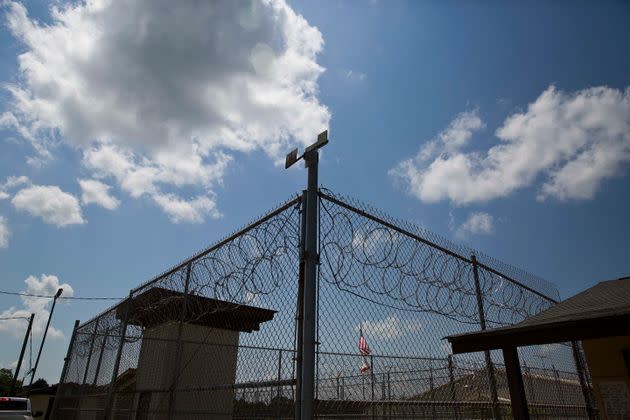Alabama Prisoners Sue State Over 'Modern-Day Slavery’ Work Programs
Current and former prisoners in Alabama filed a lawsuit in federal court Tuesday arguing that the state’s prison labor system amounts to a “modern-day form of slavery” that violates the U.S. and Alabama constitutions.
The complaint, brought with the support of labor unions, alleges that Alabama profits to the tune of more than $450 million a year through coerced work, and that fast food companies and other private corporations benefit from an unlawful “labor trafficking scheme.”
The proposed class action lawsuit seeks to abolish a “captive labor source” for the state and award current and past prisoners with damages. The defendants include the state’s Republican governor, Kay Ivey, and its Republican attorney general, Steve Marshall, along with Alabama corrections and parole officials.
Janet Herold, a lawyer for the plaintiffs, said in a press conference Tuesday that the prison work programs are “the modern reincarnation of the notorious convict-leasing system that replaced slavery after the Civil War.”
“We are not talking here today about a new Jim Crow,” said Herold, legal director of the legal aid group Justice Catalyst Law. “We’re talking here about the old Jim Crow.”
Ivey’s office did not immediately comment on the lawsuit Tuesday.
The plaintiffs ― which include two labor groups, the Union of Southern Service Workers and the Retail, Wholesale and Department Store Union ― argue that the state’s parole system has disproportionately trapped Black prisoners in jobs working for little or no pay.
We are not talking here today about a new Jim Crow. We’re talking here about the old Jim Crow.Attorney Janet Herold
The state takes 40% from prisoners’ gross earnings in work-release jobs, while prisoners face other deductions for transportation and uniform cleaning, pushing pay rates well below the Alabama minimum wage of $7.25 per hour, according to the complaint.
The lawsuit states that hundreds of prisoners work in the state’s “correctional industries” program, producing clothing, license plates and other goods that government agencies purchase, with workers starting at a pay rate of “25 cents per hour or less.”
Prisoners working for state and local government agencies are paid $2 per day, the complaint states, calling it “remarkably the same daily wage rate that the State of Alabama set for incarcerated labor in 1927.”
Lakiera Walker, one of the plaintiffs, said she served 15 years in the prison system starting in 2007, including stints working on a county road crew for $2 a day and in the warehouse of a private meat company. She said that prisoners who refused to work ended up “in segregation.”
“You did what you had to do to survive,” Walker, who was released earlier this year, said at the press conference. “I’m out, but my heart is still there with my friends and family who have to suffer that.”
She added: “They can say, ‘Oh, we don’t have forced labor,’ but you have so many women on the inside right now who are afraid to speak out for the fear of retaliation.”

Prisoners argue that Alabama's prison work system violates the 14th Amendment of the U.S. Constitution.
Scott Douglas, director of Greater Birmingham Ministries, called the system “one of the largest sanctioned human trafficking rings.”
The lawsuit argues that the system violates the 14th Amendment of the U.S. Constitution, which guarantees equal protection regardless of race, as well as a recent amendment to Alabama’s state constitution, which bars involuntary servitude as punishment for a crime.
Like many states, Alabama pays its incarcerated workers little to no money for their labor, a practice made possible by an exception to the 13th Amendment’s prohibition on slavery. Most prison systems are highly dependent on incarcerated workers, who prepare meals, do laundry, conduct facility maintenance and build goods that the state sells at a profit.
In 2020, the Justice Department took the rare step of suing Alabama’s Department of Corrections for allegedly incarcerating people in unsanitary conditions and failing to protect the people in its custody from violence, both from prison staff and from other prisoners.
They can say, ‘Oh, we don't have forced labor,’ but you have so many women on the inside right now who are afraid to speak out for the fear of retaliation.Lakiera Walker, plaintiff and former prisoner
Conditions only worsened after the lawsuit, according to prison organizers in Alabama. Last year, thousands of the state’s incarcerated workers went on strike to protest inhumane living conditions and the low parole release rate of about 10%.
“We have more people coming out in body bags than on parole,” strike organizer Diyawn Caldwell told HuffPost at the time. With the exception of people with a set release date, “you have a living death sentence,” she said. “There’s no way out.”
They demanded improved medical treatment, consistent parole guidelines, repeal of the state’s habitual offender law, the abolition of life-without-parole sentences and a conviction integrity unit to examine wrongful convictions. Ivey called their demands “unreasonable.”
Last November, shortly after the strike began, Alabama voters passed a ballot measure to amend the constitution to eradicate involuntary servitude. The measure was a landslide success, with 76% voting in support. But in the year since, Alabama’s prison labor practices have remained in place.
The current and former prisoners said in their lawsuit that the state ultimately violated the state constitution and denied “the will of the voters,” by forcing them to work “whether they want to or not.”
